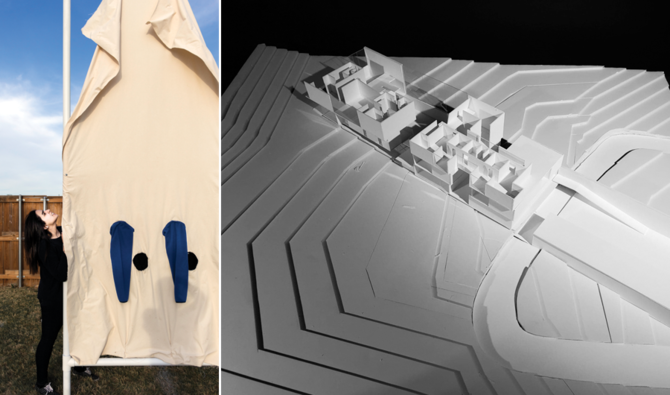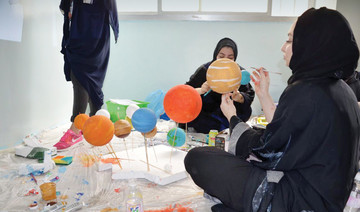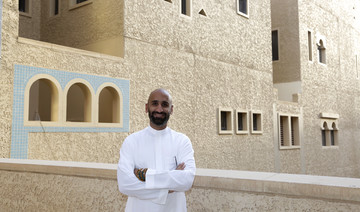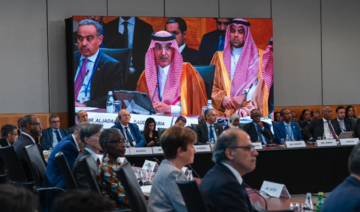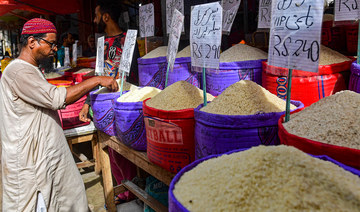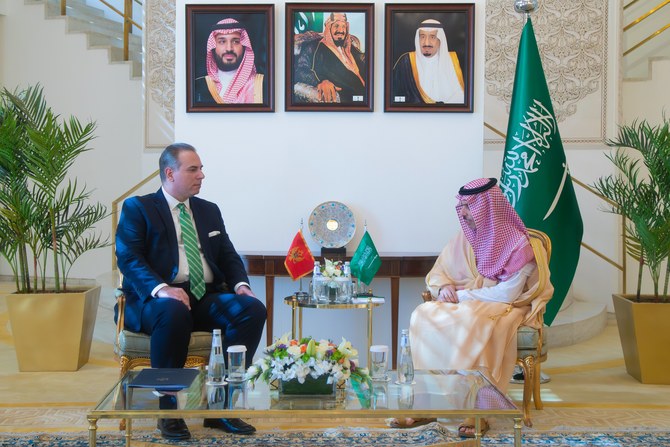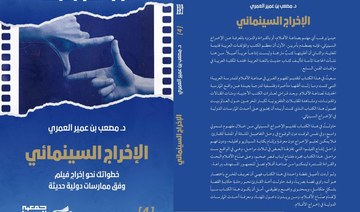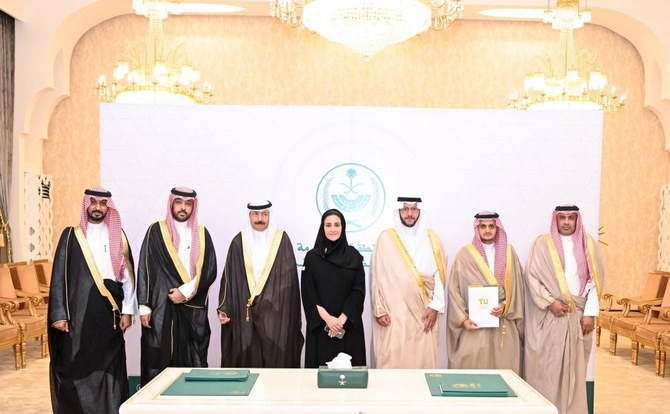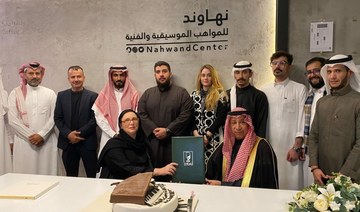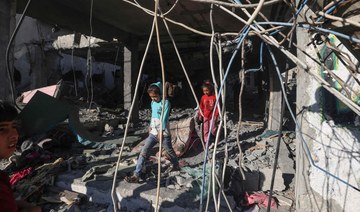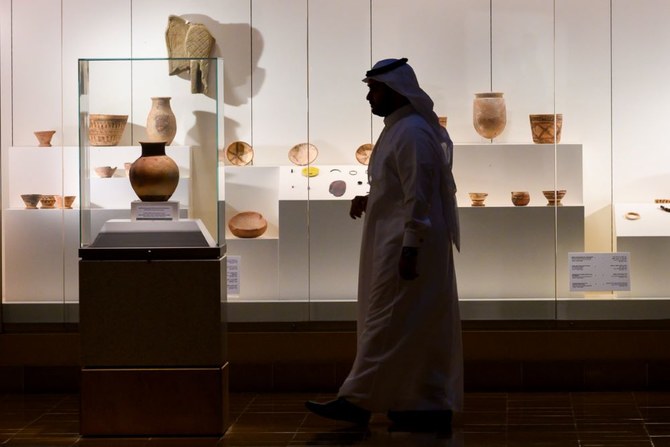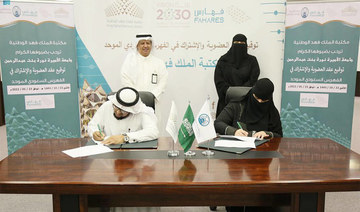JEDDAH: We all know that life is not a bed of roses. It throws challenges at us in different phases of our lives. Some of us fail to cope with the pressure and choose the path of mediocrity.
Many, however, soldier on and take life’s challenges head-on. They fall down and get up a hundred times and pave their own paths to success and inspire others to follow suit.
Lian Fathi, 23, is one of those people who refused to play a victim. The young Saudi transformed her experiences into strength and emerged victorious in her fight against neuropathy. She may have won the battle but the war against her condition is still on. Fathi, however, is optimistic and she does not allow her health issues bog her down.
Neuropathy is a result of damage to one’s peripheral nerves. It often causes weakness, numbness and pain usually in hands and feet. It can also affect other parts of the body.
Fathi is pursuing her master’s degree in professional architecture at Texas Tech University in the US. She aims to obtain a certificate in the field of health care and facilities design.
With neuropathy diagnosed in 2015, Fathi has experienced first-hand the problems people with different types of physical disabilities have to face.
Talking about her early days in architecture school, she admitted that not many students had a concrete plan to follow for their future. There were many questions in their heads and many different paths in front of them.
Fathi says she was no different, as she had really no idea, which path to choose from different options such as designing commercial or residential buildings etc. Two years passed by in this quest or rather confusion.
“It was only when I was diagnosed with neuropathy in 2015, I began realizing my true calling. No one ever thinks that sometime in their adult life they will lose their ability to walk. To me it proved to be a blessing in disguise, as I understood the difficulties people with physical disabilities face daily,” she said.
The young girl admitted that she had become depressed but bounced back from that mental state and fought for her health.
“I am not completely cured. It may appear that I am walking normally but every step that I take is painful,” she said. Fathi said many people suffer from this medical condition “but I am on the severe side of the spectrum. Three years ago, on my way back to Lubbock, Texas, for the beginning of a new semester, I fell extremely ill. My body rejected everything —water and food. Subsequently, I was hospitalized.”
“By that time, I had already lost all my muscle mass and I did not have any energy left and I almost became 50 percent paralyzed. Due to my severe health condition, I had to drop my semester. Within a few weeks, I lost the ability to walk,” she told Arab News. Fathi was transported back to Jeddah where she underwent physical therapy. “Sept. 27, 2015, was my first day in a wheelchair,” she reminisced.
Her ordeal made her realize the importance of architecture and building design for people with special needs.
“After going through six months of physical therapy daily, I made progress. I remained wheelchair bound for 3 months, and then I began standing on my own. I used a walker for two more months until I was able to rely on one cane. It took me a long time to try to get rid of the cane, and even when I did, I started to rely on the walls around me to help me move around without falling. I was determined that I wanted to go back to school within a year, and I did it,” she said.
“Sensory design in the architecture field is not very common, however, I think there is potential for associating designs using the senses (sight, hearing, touch, taste, and smell) to improve daily architecture not only for people with physical disabilities, but for everyone.
“Many architecture buildings are designed using elements to enhance people’s senses such as the Pritzker Prize winner Toyo Ito. There has barely been any focus on people with disabilities around the world, and there has been very little progress in designing for them,” she deplored.
Fathi, who was involved in a number of architectural projects at her university, aimed to serve those with disabilities.
“I have a few projects that focus on people with disabilities. My first project was actually a research paper with Dr. Julie Zook that I presented and published in CALUE (Center for Active Learning and Undergraduate Engagement) conference in April 2016. I tested 16 architecture students and their skills for designing for people with physical disabilities. The students had 90 minutes to re-design an existing house in Europe to accommodate it for a client that is in a wheelchair.
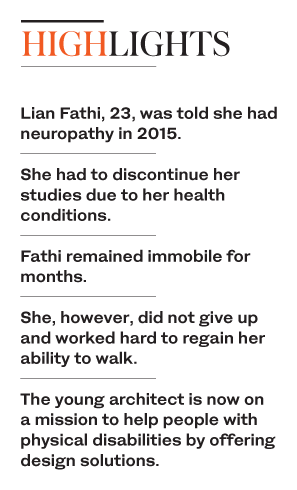 “Eight of them were undergraduate architecture students, and the other eight were architecture graduate students. The designs were judged by Prof. Darrick Wade and Prof. Upe Flueckiger and the graduate students barely did a better design than the undergraduate. As a result, I proved with this research that architecture schools do not focus on design for particular individuals and the ADA (Americans with Disabilities Act) is taken for granted,” she said.
“Eight of them were undergraduate architecture students, and the other eight were architecture graduate students. The designs were judged by Prof. Darrick Wade and Prof. Upe Flueckiger and the graduate students barely did a better design than the undergraduate. As a result, I proved with this research that architecture schools do not focus on design for particular individuals and the ADA (Americans with Disabilities Act) is taken for granted,” she said.
She said as the second project she worked on Sense-Ability with Hector Issac Guerra and Prof. Wade, which was an installation that was divided into three different phases. “The installation takes the sight sense away to enhance the sense of touch. With taking the most intimate action any stranger can have with one another, a hug, this installation explores seven panels that are 3.7 meters high and 1.2 meters wide,” she said.
She is currently working on the findings of over 100 surveys and plans to author a research paper soon. “The latest project that truly explored design for a person with a physical disability was in my first master’s design studio class. It was a team design project and I was fortunate to have Marisol Martinez and Richard Zamorano as my team members. My team and I designed a house that was completely wheelchair accessible for a doctor who was wheelchair bound. The house we designed consisted of half levels and ramps connecting five floors together,” she said.
Her future plans include finding design solutions to embrace those with special needs.
“In the near future, I hope to research more on design solutions to help people with physical disabilities. When I was barely walking, I wanted to rely on the architecture around me, but I could not find anything to rely on and I do not want others to face the same problem.
“I plan to eventually create a design palette with rigorous research for any designer who wants to use more sensible codes in their architecture,” she said.
She explained there are codes for parking, door clearance and such, “but what I want to achieve is suggestive design solutions to accommodate people with physical disabilities such as if the door clearance is 0.8 meters, make it 1 full meter for a person in a wheelchair to move in and out easily without any struggle. Little details can have a huge effect on the overall design and experience of people with disabilities.”


